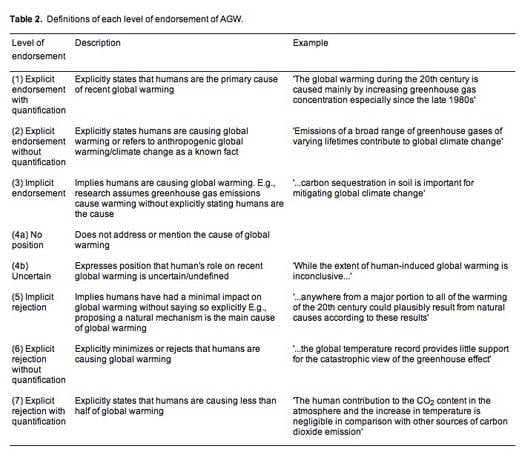This article is more than 1 year old
Climate scientists agree: Humans cause global warming
Of those who have an opinion, over 97% say we're to blame
A major study of nearly 12,000 peer-reviewed papers in the climate-science literature has – again – proven that among climate scientists, an overwhelming percentage agree with the consensus view that human activity causes global warming.
The study was led by John Cook, a post-doctoral fellow in the Global Change Institute at the University of Queensland, Australia, coauthor of Climate Change Denial: Heads in the Sand, and lead author of a paper discussing the findings of the study in question and published in Environmental Research Letters entitled "Quantifying the consensus on anthropogenic global warming in the scientific literature".
As the title of Cook's book implies, he adheres to the consensus view that anthopogenic global warming (AGW) is a fact. He also maintains the website Skeptical Science, which describes its goal as being "to explain what peer reviewed science has to say about global warming."
Cook is not a climate scientist – he's a physicist. As such, however, he has a respect for conducting his survey in an objective manner as possible, as evidenced in the methodology he and his all-volunteer team used to conduct it:
- The team searched abstracts of peer-reviewed scientific literature in the ISI Web of Science published between 1991 and 2011, and found 11,944 that included the terms "global climate change" or "global warming".
- Those abstracts were then randomly presented to and independently rated by two randomly selected team members, without information on the source or year of the paper. Team members judged whether the abstracts offered no opinion on AGW, either explicitly or implicitly endorsed or rejected AGW, or were uncertain as to the causes of global warming.
- If the two team members who examined each abstract disagreed on its rating, that abstract was then rated by a third team member to resolve the disagreement.
- When the rating effort was completed, the team found that 66.4 per cent of the abstracts expressed no position on AGW, 32.6 per cent endorsed AGW, 0.7 per cent rejected AGW, and 0.3 per cent fit in the "uncertain" category.
- The team also discovered that among the abstracts that did express an opinion – pro or con – on AGW, 97.1 per cent endorsed the position that humans are causing global warming.
- Emails were then sent to 8,547 authors, inviting them to evaluate their own papers – not merely their abstracts – using the same criteria as the evaluative team; 1,184 authors of 2,142 papers participated in this phase of the survey.
- The ratings provided by the authors who chose to participate in the study mapped closely to the results of the evaluative team: 64.6 per cent said their papers offered no position on AGW, 34.8 per cent endorsed AGW, 0.4 per cent rejected AGW, and 0.2 per cent were uncertain.
- Among self-rated papers that stated a position on AGW, 97.2 per cent endorsed the consensus view that humans are causing global warming; over half of the abstracts that the evaluative team had rated as "No Position" or "Undecided" and were self-evaluated by their authors had their ratings changed to "Endorse AGW" by those papers' authors.
The results of the survey were also analyzed in terms of the age of the papers over the 21-year period of the study; Cook and his team discovered that there was a marginal increase in the amount of endorsement of AGW over those years, reaching 98 per cent in 2011.
"Our analysis indicates that the number of papers rejecting the consensus on AGW is a vanishingly small proportion of the published research," Cook says in a video abstract of his team's paper.
Cook also points out that "These results were strikingly consistent with previous surveys," citing the 97 per cent consensus determined by a 2009 study by Peter Doran and Maggie Kendall Zimmerman, and the 97.5 per cent consensus found in a 2010 survey by William Anderegg et al.
"There is a significant gap in public perception of the actual 97 per cent consensus," he says. "When a US representative sample was asked 'How many scientists agree that humans are causing global warming?' the average answer was around 50 per cent. This misconception has real-world consequences."
Climate skeptics may question the objectivity of Cook's team, but that argument is weakened by the close correlation between their ratings and those of the scientists who wrote many of the rated papers.
More-cynical skeptics may also argue that the scientists involved are merely perpetuating the "myth" of AGW because they are in an echo chamber of group reinforcement or are anxious to keep their grant money flowing.
Perhaps. But the likelihood that over 97 per cent of climate scientists who have expressed an opinion on AGW are either that self-deluded or that venal is as "vanishingly small" as the number of peer-reviewed papers that explicitly or implicitly deny the consensus among climate scientists that we humans are major contributors to global warming. ®

